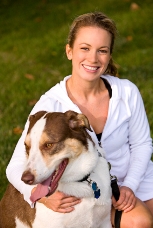Running With Your Dog

Running with your dog can be a great way for the two of you to enjoy the outdoors, get some exercise, and strengthen your bond with each other. However, you need to be aware of several important safeguards before you leash up and lace up.
First, running is not for every dog:
- Puppies are still developing their muscles and bones, and going on runs may harm their development, so it's best to wait until your pup is at least a year old and has had plenty of time to get used to walking on a leash.
- Older dogs who have joint or muscle problems or who are overweight shouldn't be going on a run either; it will cause a lot of stress on their body.
- If you're a committed runner, you may push yourself and "run through the pain," but never enforce that strategy on your dog. Let injured or sick dogs fully recover before taking them with you on a run, and above all let runs be fun for your dog, not a grueling or dangerous ordeal.
- Smaller breed dogs probably cannot keep up on a run. Better to give them walks for exercise.
- Some dogs are highly resistant to exercise. Take these couch potatoes for walks, at least until they show genuine interest in running.
Before running with your dog, work out a running program with your veterinarian to be sure it's appropriate for your four-legged best friend.
Your veterinarian is your best resource for advising you on the proper care and exercise for your dog.
When starting a run with your dog, work up to your normal routine gradually. Don't get discouraged if your dog stops to sniff, pulls on the leash, or doesn't run at the same pace as you do. After going on a few runs, your dog will likely get used to the smells, stop pulling on the leash, and learn the pace at which to run to keep up with you—practice makes perfect! Don't push your dog too hard at first; dogs need to work up their endurance, also. Being loyal companions, dogs may run themselves ragged before letting on to their humans that they're tired or sore, so be sure to pay attention to your dog while running to avoid causing overexertion. Overexertion could cause an injury that would leave your canine companion on the doggy bed at home while you're out exercising alone.
Many of the factors that you consider important for the satisfaction and safety of your run are similarly important for your dog. For example, when you're running, you want comfortable running shoes. Your dog obviously will not want to wear shoes, but will appreciate knowing that you'll pick a running spot that doesn't have rocks and gravel, which can hurt the pads of your dog's feet. In addition, concrete and asphalt can burn your dog's feet on hot days, so find a grassy park in which to run on those dog days of summer. Speaking of hot summer days, dogs need to stay hydrated just like you do, so always have water available that your dog can drink.
Dogs tend to love routines, so don't be surprised if after a few running sessions you find your dog at the door ready to head out and get going. Your furry companion may turn out to be your best motivator and workout buddy. Happy running!
Summary:
- Check with your vet before running with your dog.
- Don't run with puppies or with old, sick, injured, exercise-resistant or small-breed dogs.
- Start slowly and work up to a pace that's appropriate and comfortable for your dog.
- Choose running spots that are free of rocks and other sharp objects that may cause pain or injury.
- Avoid asphalt and other hot surfaces on hot days.
- Bring water for your dog. Dogs need to stay hydrated just as much as humans do.
You May Also Like These Articles:
How to Stop Your Dog from Jumping on People
Walking Your Dog to Help with Weight Loss
Dog Weight Loss: Tips For Helping Your Dog Lose Weight
Disclaimer: This website is not intended to replace professional consultation, diagnosis, or treatment by a licensed veterinarian. If you require any veterinary related advice, contact your veterinarian promptly. Information at DogHealth.com is exclusively of a general reference nature. Do not disregard veterinary advice or delay treatment as a result of accessing information at this site. Just Answer is an external service not affiliated with DogHealth.com.
Notice: Ask-a-Vet is an affiliated service for those who wish to speak with a veterinary professional about their pet's specific condition. Initially, a bot will ask questions to determine the general nature of your concern. Then, you will be transferred to a human. There is a charge for the service if you choose to connect to a veterinarian. Ask-a-Vet is not manned by the staff or owners of DogHealth.com, and the advice given should not delay or replace a visit to your veterinarian.

